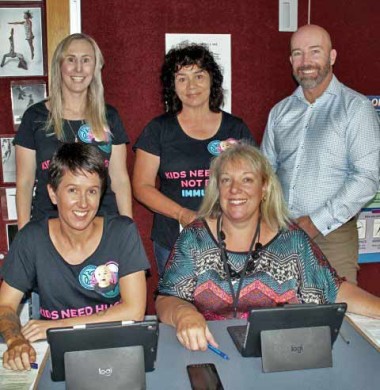Partnership Helps Nurses on the Spot

Northland DHB - PreScribe - April 2019
Over the past year Northland DHB Public Health Nurses have been the envy of other departments in the organisation after adding iPads to their tool kits as part of the hugely successful ‘PHNs On the Spot’ project.
Northland DHB and Vodafone partnered together to fund and develop the project, to supply 30 iPads to the public health nurse team. The PHNs On The Spot project was a perfect fit for the partnership as it utilises technology to generate a positive change for the Public Health Nurse Service and the people of Northland.
Each iPad has been enabled to access all the relevant internal systems and national records the nurses need to treat patients remotely.
The public health nurses can access all relevant information for client care at the point of care. They can obtain all client information while out in schools and homes; therefore, limiting travel time and cost.
Northland DHB programme manager Delwynne Sheppard said the iPads had made such a difference to how the public health nurse team work in the community setting. She said aside from the benefit of having patient information on hand at the point of care, the team can also have remote online meetings with Zoom where ever they are in the region instead of scheduling time in the office to meet which is not always easy to align due to the nature of their work.
“The nurses are thankful that they’ve got this technology when they’re out and about they can access all information to provide quality client care in the community setting. This saves time in travel, and they can spend more time with the client,” said Delwynne.
Each device is loaded with approved games and short movie clips to use during the school based vaccination programmes for distraction therapy to reduce anxiety and for use during recovery periods.
Public health nurse Libby O’Donnell said the iPads had been especially helpful when treating children with Rheumatic fever who endure monthly bicillin injections.
“It can be particularly stressful for these children, but if they’re distracted, they get through the process easier. Some even look forward to us returning, so they can have a go on the iPad again.”
Connectivity in some areas and schools in the region where there is limited access to Wi-Fi has been somewhat problematic. However, where possible the Ministry of Education and the schools have engaged and responded to this issue as much as they can. Access to the Vodafone mobile network has helped to keep the nurses connected and engaged with their community.
Part of a public health nurse’s role is to respond to outbreaks, and during the recent Meningococcal W vaccination programme in Northland, the team said having the iPads had been an invaluable tool for the retrieval of vital information on the spot and for reducing anxiety that some clients experience with vaccinations. Often parents would turn up without knowing their children’s NHI numbers, which could be sourced straight away, along with checking the patient’s age and relevant details. This access to patient information ultimately helped increase the speed of patient flow through the clinics.
Northland DHB chief information officer Darren Manley said it is fantastic to see this use of technology making a tangible difference to the lives of both patients and their carer’s.
“This project showcased the sort of partnership model needed to get the best from digital innovations, and we look forward to more of the same.”
Northland DHB mobility capability analyst Rachel Sutton said the many lessons learned during this first year of the Project has opened up a case for the development of increased technology use throughout the organisation.
Read the original article: https://www.northlanddhb.org.nz/assets/Communications/Publications/NDHB-PreScribe-Magazine-APRIL-2019.pdf
